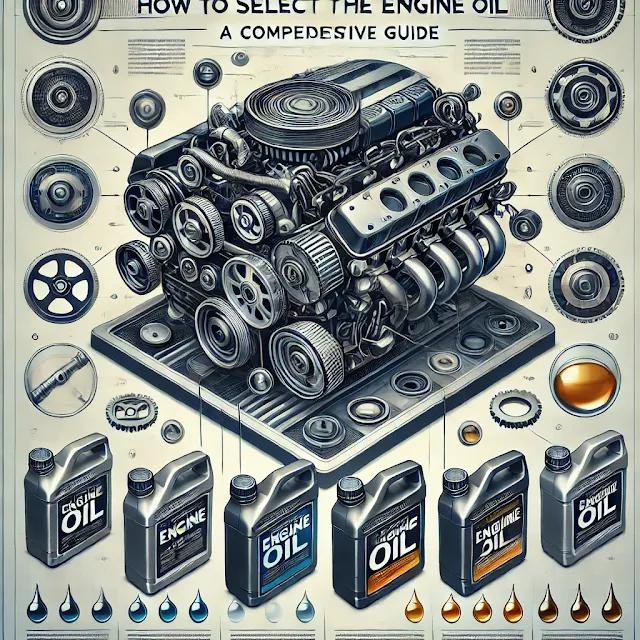Technical Guide to Engine Oil Selection: Ensuring Peak Engine Performance
Selecting the right oil for the engine is crucial for maintaining your vehicle’s overall performance, longevity, and fuel efficiency.
With a wide variety of engine oils available on the market, making the right choice can be challenging.
This guide will walk you through the essential factors to consider when selecting engine oil, ensuring that your engine remains well-lubricated and protected under all operating conditions.
Understand Your Engine’s Requirements
The first step in selecting the right engine oil is to understand the specific needs of your engine.
The manufacturer’s recommendations, found in your vehicle’s owner’s manual, should be your primary guide. These recommendations typically include:
- Viscosity Grade: The viscosity of an oil, indicated by a number (e.g., 5W-30), refers to its thickness and flow characteristics at different temperatures.
- Oil Type: Recommendations might specify whether to use synthetic, semi-synthetic, or conventional mineral oil.
- Industry Standards and Certifications: Look for oils that meet specific industry standards such as API (American Petroleum Institute) or ACEA (European Automobile Manufacturers' Association).
- Manufacturers Specifications and Approvals: Specifications and approvals are critical components in ensuring the compatibility and performance of lubricants in specific equipment. An OEM specification is a set of technical requirements provided by the original equipment manufacturer (OEM) that defines the type and performance characteristics of lubricants suitable for use in their equipment. These specifications are tailored to the equipment's specific needs, considering factors such as engine type, operating conditions, and expected performance to ensure optimal functionality and protection. Meanwhile, OEM approval goes beyond these specifications; it is a formal endorsement from the manufacturer stating that a particular oil formulation has been rigorously tested and verified to meet their specific standards. This approval provides assurance that the lubricant will deliver the required performance and protection as intended by the equipment manufacturer.
Understand Viscosity Grades
Viscosity is the most important characteristic to consider when selecting engine oil.
It determines how well the oil flows at different temperatures, affecting engine start-up performance, fuel efficiency, and protection at high temperatures.
- Multigrade Oils: Most modern vehicles use multigrade oils like 5W-30 or 10W-40. The first number with a "W" (Winter) represents the oil's viscosity at low temperatures, while the second number indicates its viscosity at high operating temperatures.
- Lower Winter Grade (e.g., 0W-20, 5W-30): These oils flow better at low temperatures, making them ideal for cold climates. They reduce wear during cold starts by providing faster lubrication.
- Higher Summer Grade (e.g., 10W-40, 15W-50): These oils maintain their viscosity at higher temperatures, offering better protection in hot climates or under heavy load conditions.
Choose the Right Type of Engine Oil
Engine oils come in three main types: synthetic, semi-synthetic, and mineral (conventional). Each has its advantages and is suited to different applications.
Synthetic Oils:
Semi-Synthetic Oils:
Mineral Oils:
Consider Your Driving Conditions
Your driving habits and conditions play a significant role in determining the right engine oil.
- Frequent Short Trips: If you make a lot of short trips, the engine might not reach its optimal operating temperature, leading to sludge buildup. In this case, consider using synthetic oil with better detergent properties.
- Highway Driving: For long highway drives, an oil with higher thermal stability and oxidation resistance, like a synthetic oil, is beneficial.
- Extreme Temperatures: In very cold or hot climates, choose an oil with appropriate viscosity grades to ensure optimal flow and protection.
- Towing and Heavy Loads: If you frequently tow or carry heavy loads, select an oil with higher viscosity to protect the engine under increased stress.
Analyze Oil Additives
Engine oils often include additives to enhance protection and performance.
Common additives include:
- Detergents: Keep the engine clean by preventing sludge and varnish buildup.
- Dispersants: Help keep contaminants suspended in the oil, preventing them from settling and forming deposits.
- Anti-Wear Agents: Such as Zinc Dialkyl Dithiophosphate (ZDDP), protect engine components from wear, especially in high-pressure areas like the camshaft.
- Antioxidants: Prevent oxidation, which can lead to oil thickening and sludge formation.
- Viscosity Index Improvers: Help stabilize the oil's viscosity over a broad temperature range.
Factor in Oil Change Intervals
The recommended oil change interval varies based on the oil type, driving conditions, and manufacturer’s guidelines.
Synthetic oils typically allow for longer intervals between changes, sometimes up to 15,000 miles (24,000 kilometers), while conventional oils might require changes every 3,000 to 5,000 miles (4,800 to 8,000 kilometers).
In case you opt for extended oil change intervals, make sure to use high-quality synthetic oil and a top-grade oil filter to maintain engine protection.
Consider Environmental Impact
If environmental sustainability is a priority, consider biodegradable or eco-friendly oils.
These oils are designed to reduce environmental impact and are often derived from renewable sources.
To recap, Selecting the right engine oil is vital for maintaining your vehicle’s health and performance.
By considering factors such as viscosity, oil type, industry standards, driving conditions, and oil additives, you can make an informed decision that ensures your engine remains protected and efficient.
Always refer to your vehicle’s owner’s manual for the manufacturer’s recommendations, and don’t hesitate to consult a professional if you’re uncertain.
The right engine oil not only extends the life of your engine but also improves fuel efficiency, reduces emissions, and enhances overall driving performance.
Keep these guidelines in mind the next time you’re shopping for engine oil, and your engine will thank you.






